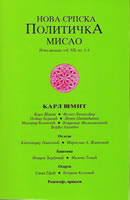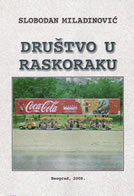| NSPM in English | |||
(N)either East – (n)or West |
 |
 |
 |
| четвртак, 14. август 2008. | |
|
The Serbian general public is practically undivided when it comes to opposing Kosovo's independence, and even though it is lacking a clear idea about what would be an ideal solution, it is almost as unanimous in its rejection of the full independence of its southern province as it is in the sense of injustice inflicted on Serbia by means of that independence. On the other side, even though it had never been made official at the state level, the pro-European course and entering the European Union were declared as more or less an undisputed national cause of the post-Milosevic Serbia, and there was no differentiating about it, in principle, between the actors in the Serbian political scene. Literally speaking, not one single parliamentary party in Serbia, including the parties of the old regime (Milosevic’s socialists and Vojislav Seselj’s radicals), ever openly opposed Serbia’s entry into the EU – until this last culmination of the Kosovo crisis. The only significant point of divergence regarding Serbian foreign policy alignment was its relation towards NATO, which was never supported by more than a quarter of the population. Still, up to a year ago, NATO was regularly and successfully smuggled into the public arena through the syntagm ‘Euroatlantic integrations’, and it was prospering from the popularity of the EU. This all came to an end when the party of the recent Prime Minister, Vojislav Kostunica, managed to keep it under constant attack and eventually dissolve it. Once the above-mentioned - , all but insignificant and merely lexical vagueness about what is in fact implied by ‘Euro-Atlantic integration’ and whether NATO is a must-stop on the road to EU is cleared up, the Serbian geopolitical equation becomes fairly easily solvable and not really complex. Although a dominant majority of Serbs want to join the EU, they are skeptical about NATO and they are absolutely against the independence of Kosovo. But things became drastically more complicated with Kosovo receiving open support from not only the USA and NATO, but also from the EU on its road to independence, which pushed Serbian foreign policy as well as its public opinion into a state of almost nightmarish chaos. Serbian officials, like most of the citizens, have declared themselves in favour of entering the EU, and at the same time, oppose the independence of Kosovo – which this very EU in its majority recognizes, supports and finances. In short, the Serbs care about Kosovo, but they also care about the EU, and the EU, aided by the USA, is de facto taking Kosovo away. This slightly schizoid situation was reflected in the slogan ‘Both Kosovo And Europe’, cast by the ruling political coalition gathered around President Boris Tadic, and used in this last electoral cycle, grasping feverishly at the proverbial branch offered by the Brussels administration, claiming that Serbian accession to EU and resolving Kosovo's status are two ‘parallel processes’, independent of each other. However unconvincing this might appear, on top of being incessantly repudiated by the ever more direct pressure the West is applying on Belgrade to give up Kosovo and ‘turn to the future’, this point about ‘the parallel processes’ still managed to have a strong impact on the majority of the Serbian electorate – and not only as a result of aggressive marketing, but also because it reflects the real ambivalent longings of the same body of the electorate. Still, however handy the slogan ‘Both Kosovo and Europe’ is for the pre-election campaign, the message will be very hard to translate into an operational foreign policy, especially in conditions of intensified political pressure from Western capitals, and it is highly likely that the Serbian political elite as well as the electorate would in the near future again face the dilemma Kosovo or the EU – only with sharper differences. Finally, to make the whole thing even more complicated, this foreign policy confusion also involves Russia which, by consistently opposing imposed solutions in the Security Council and upholding the principles of international law, managed to come forward as a factor insisting on preservation of the existing international order, and after a while, returned to the Balkans as a relevant political player. By doing this, the Serbian political life and public opinion were injected with another geopolitical constant. Russia was once non-existent here, whether due to the political and economic problems it had during the nineties, or due to the one-sided pro-western orientation of the Serbian post-Milosevic authorities. But the closeness of the stands arising from the Kosovo crisis and the determining contribution of Russia in opposing the intention of the leading western countries to pass and adopt Ahtisaari Plan in the UN Security Council, played a key role in the growing sympathies of Serbs towards Putin’s Russia. Even though the option in surveys of ‘closest links with Russia’ is lagging some 10% behind the popularity of the EU (60:73,5), it is still on average two or three times more popular than entering NATO (59.97:23.98%) . This might not be enough for some huge shift and realignment of the Serbian foreign policy, which never did coincide to a great extent to the public mood and opinion, but it could certainly be a trigger for its partial correction and geopolitical balancing. The author is the editor in chief of the magazine the Nova srpska politička misao (New Serbian Political Thought)
(In Press, No 4, August 2008, Brussels) |
Од истог аутора
Остали чланци у рубрици
- Playing With Fire in Ukraine
- Kosovo as a res extra commercium and the alchemy of colonization
- The Balkans XX years after NATO aggression: the case of the Republic of Srpska – past, present and future
- Из архиве - Remarks Before the Foreign Affairs Committee of the European Parliament
- Dysfunction in the Balkans - Can the Post-Yugoslav Settlement Survive?
- Serbia’s latest would-be savior is a modernizer, a strongman - or both
- Why the Ukraine Crisis Is the West’s Fault
- The Ghosts of World War I Circle over Ukraine
- Nato's action plan in Ukraine is right out of Dr Strangelove
- Why Yanukovych Said No to Europe

.jpg)





















